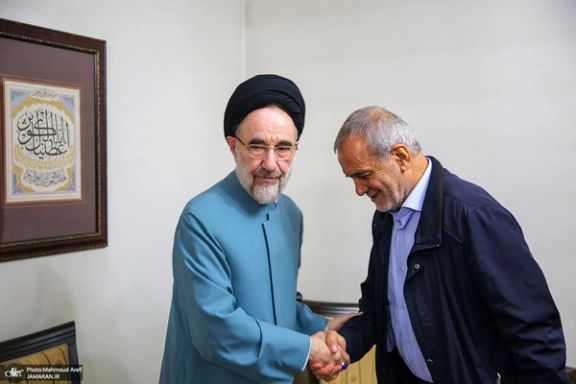Pezeshkian condemns restrictions on ex-president Khatami

In a cabinet meeting this week, President Masoud Pezeshkian voiced his opposition to restrictions placed on the public appearances of former President Mohammad Khatami, the unofficial leader of the Reform Front.
“The situation in the country was supposed to improve, we were not meant to witness such unjustified restrictions anymore,” Pezeshkian said during the Sunday evening meeting.
The comments follow a recent incident where Khatami was barred from attending a public event, as well as the indictment of prominent Reformist economist Mohsen Renani.
According to the moderate news outlet Asr-e Iran, Pezeshkian also directed Intelligence Minister Esmail Khatib and Justice Minister Amin-Hossein Rahimi to urgently address the issue and provide a report on measures to avoid similar incidents in the future.
Restrictions imposed on Khatami and Renani
During the inauguration of a charity cancer center in Tehran last Thursday, Fatemeh Hashemi, daughter of former President Akbar Hashemi Rafsanjani, revealed that Khatami had not been “granted permission” to attend the ceremony.
It remains unclear which security agency or authority ordered Khatami’s exclusion, but it is widely believed to have come from intelligence agencies.
Reformists and the media argued in the past few days that Pezeshkian should have challenged the higher powers responsible for the ban.
In the case of economist Renani, the state’s Revolutionary Court recently ordered the blocking of his personal website and Telegram channel due to articles he published several years ago and indicted him for some of his writings considered “propaganda against the system.”
President facing backlash over restrictions
Pezeshkian has faced significant criticism from Iranian media, politicians, and the public for the incident involving Khatami and Renani’s indictment.
Critics, many of whom believe Pezeshkian was not directly responsible for the restrictions, have pointed out the inconsistency between his calls for “unity” among political forces and the actions taken against prominent figures by other centers of power under his watch.
In an open letter released Sunday, prominent university professors called on Pezeshkian to uphold freedom of expression and basic rights, urging him to address the restrictions and accusations against Renani for his scholarly work.
Reform Front’s response
Javad Emam, spokesperson for the Reform Front, criticized the exclusion of reformist figures and their supporters from the government, despite calls for unity and national reconciliation.
The Reform Front officially backed Pezeshkian’s bid for the presidency, with Khatami separately endorsing Pezeshkian in a video message to Iranians.
“To achieve unity, one cannot ignore supporters and exclude them from events, political participation, and decision-making,” Emam told a local news website on Friday.
The spokesperson said that Pezeshkian chose 16 of the 19 ministers in his cabinet from among hardliners and ultra-hardliners, despite his promise to engage all political factions.
Pointing out that half of Iranians chose not to vote in the presidential elections, he added that the public's exclusion from the decision-making process is also a serious issue and the wishes of those who did not vote should not be ignored.
“People must decide for themselves and shape their destiny. No one must decide for the nation and then burden them with the consequences,” he said, adding, “Has any representative of that fifty percent [who abstained] been given the opportunity to voice their concerns? What steps have been taken so far to make them feel included and satisfied?”
Criticism from prominent reformist commentator
Outspoken Reformist commentator Sadegh Zibakalam also criticized Pezeshkian’s failure to deliver on his promises of unity in light of his concessions to hardliners and the recent events.
When asked by a reporter last week how much Pezeshkian had achieved in creating unity, Zibakalam sarcastically replied, “100 percent!”
When asked for examples, he listed what he thought Pezeshkian had not done: he had not visited the grave of Mahsa Jina Amini, whose death in the custody of the so-called morality police sparked the 2022-2023 “Woman, Life, Freedom” protests. He also said Pezeshkian failed to meet with prominent dissidents and political prisoners.
At last week's National Unity Conference in Tehran, where Pezeshkian also spoke, Zibakalam argued that the President could not reconcile the deep political and ideological differences with ultra-hardliners.
He pointed to the significant influence of former nuclear negotiator and hardliner Saeed Jalili, lawmaker Hamid Rasaei, and their supporters in Pezeshkian's administration, reinforcing his view that Pezeshkian is advocating a "sham" unity.